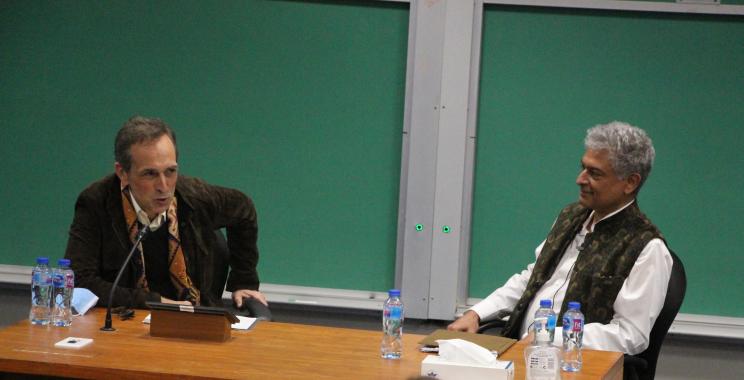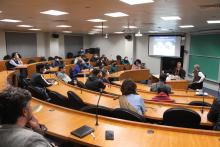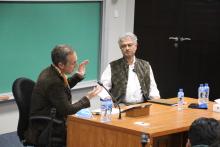
On Monday, November 29th, 2021, a "Conversations with Changemakers" series session was held at Suleman Dawood School of Business – LUMS. Mr. Julien Harneis (UN Resident Coordinator and Humanitarian Coordinator in Pakistan) was hosted by Honorary Dean SDSB, Dr Alnoor Bhimani.
Dr. Bhimani introduced Mr. Harneis, highlighting his education at Cambridge and INSEAD, and a 30-year career in the development sector, including Africa and Indonesia. Mr. Harneis began the session by remarking, "I think what is interesting about Pakistan is the diversity of the challenges in the country. You look at what's going on in a rural part, and you'd have one vision of what Pakistan is - if you go to Karachi, you're getting a completely different vision. So, you've got a country with huge economic potential that produces brilliant, educated people. Pakistan is not your average middle income developing country with a tight set of problems; it is a country that has a huge diversity of challenges. Furthermore, I think my experience in different scenarios and contexts is to bring a certain amount of understanding about how you deal with different types of development challenges and help the UN be supportive to Pakistan.”
Mr. Julien Harneis described his decision to go to business school by adding, "An MBA brought me a set of tools and thinking about attacking problems rigorously from a multi-dimensional perspective. So, never look at a problem as being purely financial; a problem can be financial, it can be a management problem, it can be a motivational problem, it can be an environmental problem, but always go at it with a rigorous analytical lens. At the UN, I found that rigour is immensely useful. And you know, that's why I'm so delighted to be here with LUMS students. Because I see you as taking that rigour to Pakistan, Pakistani society, Pakistani businesses, and making yourself successful."
Dr. Bhimani then asked, "We see a lot of individuals opting for the private sector and maybe getting into the development sector. What was the trigger point when you went from private sector to development sector?” Mr. Harneis responded, "I worked in business for a while; it was intellectually challenging and interesting. It just wasn't making an emotional connection for me. I didn't feel it was giving me that energy to be successful. In my work at the UN, I have no doubt in my mind that it drives me, and I want to succeed, because that's what matters to me."
Responding to Dr. Bhimani’s question about the SDGs (Sustainable Development Goals), Julien Harneis said, "I think one of the worries I have when people talk about climate change is it's too easily blamed on somebody else. The global contribution to global warming is an issue which needs to be dealt with internationally. That is very clear. However, at the same time, there are things that we can be doing in our own environment that if we do not do right now, people will keep dying. How we are managing the Indus River system and the industrial system is contributing to pollution. You have plastic pollution, and arsenic pollution, which not just affects Punjab but also Sindh. There are waterborne diseases, all through the river system which has sustained what is now Pakistan for hundreds of years. With increasing levels of pollution and climate change, it's not going to last another hundred years. We in Pakistan have a massive challenge, which we can impact if we act together.
Dr. Alnoor then asked, "How much of a role do you play in the greater regulation or is it more a sense of statutory oversight? Also, do you think it's just going to take off voluntarily on the part of organisations?” Julien Harneis answered, "My personal belief is that it is about sustaining the industry of a system, and it's so critical to our society. I think yes, regulation and not just regulation, but also making sure that regulations are applied and observed is crucial. In Pakistan, we have a very productive legislature, but it does not always lead to changes in application through government. And so, I think we need to work a great deal more on the application of laws. So, part of it is regulation, and part of it is the application of the regulation. The other thing is working with people like yourselves to change perceptions in society. You can only implement new laws and regulations if there is support within society. You cannot impose laws on people that don't want those laws."
Dr. Bhimani asked the concluding question on how Suleman Dawood School of Business – LUMS could participate in this process. Mr. Harneis answered, "Pakistan is going through a long-term transition which is very exciting, and the dynamics are changing. But the challenge elected politicians face is that they receive very little policy advice from experts in academia. Especially for domestic policies, there should be think tanks within academia and active engagement with experts to drive policy. LUMS can play a vital role in domestic economy and policy especially in the climate change agenda."
In his concluding remarks, Julien Harneis expressed his optimism about the situation in Pakistan. This was followed by a Question and Answer session with students. The event concluded with a note of thanks by the Honorary Dean.










